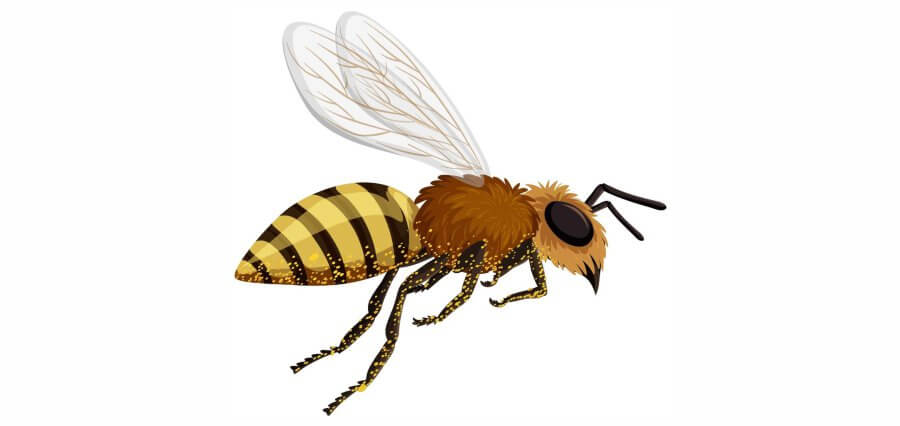-The most promising alternative therapy for treating cancer
Bee venom has emerged as a promising alternative therapy that is effective enough for treating cancer. It has gained significant attention in recent years, with researchers exploring the potential of various natural substances to combat the disease. Several studies have confirmed its effectiveness in treating various types of cancer, including ovarian, prostate, breast, and hepatocellular carcinoma.
In this context, this article will focus on the therapeutic potential of bee venom and its primary component, melittin, in the treatment of cancer, exploring the latest research findings and their implications for cancer therapy.
What is Bee Venom:
Bee venom is a clear, odorless liquid that is produced by honeybees. It is a complex mixture of proteins, enzymes, and other bioactive molecules. When a bee stings, it injects venom into the skin, which can cause pain, swelling, and redness. However, bee venom has also been found to have therapeutic properties and is used in apitherapy to treat a variety of conditions such as arthritis, multiple sclerosis, and chronic pain. It is believed that the anti-inflammatory and pain-relieving effects of bee venom are due to the presence of compounds such as melittin, apamin, and adolapin.
4 Types of Cancers Being Treated by Bee Venom: – Ovarian, Prostate, Breast, and Hepatocellular Carcinoma
Cancer is a disease characterized by the uncontrolled growth and spread of abnormal cells in the body. These cells can form tumors or invade other parts of the body, disrupting normal bodily functions. There are many types of cancer, and each type is classified based on the type of cell or tissue where the cancer originates. Below are 4 Types of Cancers Being Treated by Bee Venom:
- Ovarian cancer is a cancer that starts in the ovaries, the reproductive organs in women that produce eggs. It can be difficult to detect in its early stages, and symptoms may include abdominal bloating, pain, and changes in bowel and bladder habits. Treatment typically involves surgery to remove the affected ovary and other nearby tissues, as well as chemotherapy.
- Prostate cancer is a cancer that occurs in the prostate gland, a small gland located in men that produces seminal fluid. It is one of the most common types of cancer in men, and symptoms may include difficulty urinating, blood in the urine, and pain in the lower back or hips. Treatment may involve surgery, radiation therapy, or hormone therapy.
- Breast cancer is a cancer that forms in the breast tissue. It is the most common type of cancer in women, although men can also develop breast cancer. Symptoms may include a lump or thickening in the breast or armpit, nipple discharge or inversion, and changes in the texture or appearance of the breast. Treatment may involve surgery, radiation therapy, chemotherapy, or hormone therapy.
- Hepatocellular carcinoma is a type of liver cancer that starts in the liver cells. It is often associated with chronic liver disease, such as cirrhosis caused by hepatitis B or C infection. Symptoms may include abdominal pain, jaundice, and weight loss. Treatment options may include surgery, chemotherapy, radiation therapy, and targeted therapy.
What is Bee Venom Alternative Therapy for Treating Cancer?
Alternative therapy for treating cancer is a term that refers to treatments that are used in place of or in addition to conventional medical treatments such as surgery, chemotherapy, and radiation therapy. While some alternative therapies may provide relief from cancer symptoms or side effects of cancer treatment, there is no scientific evidence to support the use of alternative therapies as a primary treatment for cancer. In fact, some alternative therapies may be harmful and can interfere with the effectiveness of conventional cancer treatments.
However, one alternative therapy, bee venom therapy, is redefying the general notion of ineffectiveness of alternative therapy for treating cancer. Bee venom therapy involves the use of bee venom to treat a variety of health conditions, including arthritis, multiple sclerosis, and even cancer. The venom is typically administered through bee stings or injections.
Bee venom contains a variety of active compounds, including melittin, apamin, and adolapin, which have anti-inflammatory and anti-cancer properties. These compounds may help to reduce inflammation, stimulate the immune system, and even induce cell death in cancer cells. While research into the potential benefits of bee venom therapy is still ongoing, some studies have shown promising results, and many people who have undergone bee venom therapy report improvements in their symptoms.
It’s worth noting that bee venom therapy can also have serious side effects, including allergic reactions and anaphylaxis. Therefore, it should only be administered by a qualified healthcare professional who is trained in the use of bee venom therapy and under close supervision.
To ensure the safe and effective use of bee venom therapy in treating cancer, various studies have been conducted on bee venom and melittin to develop appropriate vehicles that can deliver an appropriate dose to cancer cells. These studies have shown that bee venom and melittin can effectively treat ovarian cancer, prostate cancer, human malignant hepatocellular carcinoma, and breast cancer. However, integrated research is necessary to draw more definitive conclusions as the cell lines, vehicles, and outcomes of these studies differ.
While alternative therapies should not be used as a primary treatment for cancer, bee venom therapy has shown potential as a complementary therapy in treating certain types of cancer. Nonetheless, bee venom therapy should only be administered by a qualified healthcare professional and under close supervision due to the possibility of serious side effects. Further research is needed to understand the full extent of its effectiveness in treating cancer.
The Future of Cancer Treatment Using Bee Venom:
The future of cancer treatment using bee venom is still uncertain and requires further research to fully understand its potential benefits and risks. While initial studies have shown promising results, more extensive clinical trials are needed to fully understand the effectiveness of bee venom therapy for cancer treatment.
However, the potential benefits of bee venom therapy are encouraging. Bee venom contains compounds that have anti-inflammatory and anti-cancer properties, and research has shown that these compounds may help to reduce inflammation, stimulate the immune system, and even induce cell death in cancer cells.
Additionally, the use of bee venom therapy in cancer treatment could potentially reduce the need for conventional treatments such as chemotherapy and radiation therapy, which can have harsh side effects.
Despite these potential benefits, it is important to proceed with caution when it comes to bee venom therapy. The therapy can have serious side effects, including allergic reactions and anaphylaxis, and should only be administered by a qualified healthcare professional who is trained in the use of bee venom therapy and under close supervision.
In conclusion, alternative therapy for treating cancer refers to treatments that are used in place of or in addition to conventional medical treatments such as surgery, chemotherapy, and radiation therapy. Bee venom therapy is a type of alternative therapy that involves the use of bee venom to treat a variety of health conditions, including cancer. Bee venom contains a variety of active compounds, including melittin, apamin, and adolapin, which have anti-inflammatory and anti-cancer properties.
While bee venom therapy has shown promising results in initial studies, more extensive clinical trials are needed to fully understand its effectiveness and potential side effects. Bee Venom should only be administered by a qualified healthcare professional who is trained in the use of bee venom therapy and under close supervision. Overall, the future of cancer treatment using bee venom is promising but requires further research.
| Read More Blogs : Click Here |















